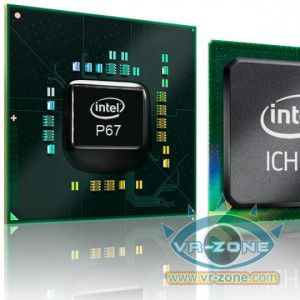- Qualcomm Launches Snapdragon 4 Gen 2 Mobile Platform
- AMD Launches Ryzen PRO 7000 Series Mobile & Desktop Platform
- Intel Launches Sleek Single-Slot Arc Pro A60 Workstation Graphics Card
- NVIDIA Announces Latest Ada Lovelace Additions: GeForce RTX 4060 Ti & RTX 4060
- Maxon Redshift With AMD Radeon GPU Rendering Support Now Available
Intel’s H67/P67 to Feature SATA 6 Gbit/s, But Not USB 3.0
According to fellow tech site VR-Zone, Intel’s upcoming chipsets to be based around the company’s Sandy Bridge processors will be called H67 and P67. The former will be for the affordable segment and the latter for the mainstream. If the “67” moniker is going to be utilized only for Sandy Bridge, it’s unlikely there will be an enthusiast model, as Sandy Bridge isn’t set to offer any truly high-end parts.
For the most part, neither of these two chipsets differ much from the current H55 and P55 offerings, but H67 looks to re-introduce a chipset-based IGP. Likewise, H67 will feature a single PCI-E 16x slot, while P67 ups the ante a wee bit by offering that, or 2 x PCI-E 8x for dual-GPU purposes. Both chipsets will include an incredible number of USB 2.0 ports… 14 in total. Unfortunately, none of these will support the latest 3.0 standard.
On the upside, both chipsets look to support 2 SATA 3.0 ports, which of course refer to 6Gbit/s speeds. I find it highly bizarre that Intel would include support for this and not USB 3.0, as personally, I feel the latter is going to be the far more interesting of the two in the months and year ahead. But the lack of official Intel support means little in the grand scheme, as motherboard vendors will have the option of adding in a chipset that opens up the support (all current USB 3.0 solutions are implemented this way).
In what might be a sign of things to come, it appears that neither the H67 or P67 chipsets are going to support legacy PCI slots, meaning if you have an add-in audio card or any other based around it, you might be out of luck. At this point, this is merely a rumor as Intel itself hasn’t officially announced the chipset. It will likely take us until this fall’s IDF before we find out for sure – or if we get lucky, we could find out in just a few weeks at IDF Beijing.

To differentiate the products, H67 will support x16 PEG only, while P67 will support either x16 PEG or 2×8 PEG. Motherboard makers will no doubt get creative with these chipsets. On top of PEG expansion, both chipsets will support x8 PCIe 2.0, and 14 USB 2.0 Ports. No, USB Super Speed isn’t on the roadmap just yet. 2 SATA 6Gb/s ports will be present on both these chipsets, out of the total 6 SATA expansion ports. There will not be PCI support with these chipsets.




